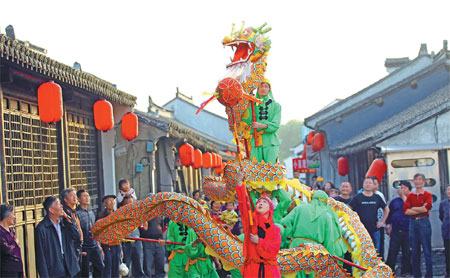Village offers visitors, city-dwellers reprieve from chaos
Updated: 2013-05-20 07:22
By Mark Hughes and Xie Yu in Wuxi (China Daily)
|
||||||||
|
The dragon dance represents the best of the ancient town of Lishe, in Wuxi, Jiangsu province. Zou Hong / China Daily |
In a changing world in which vision can be in short supply, with expensive and disastrous results if it goes wrong, the village of Shanlian in Wuxi is an exemplar of success.
Reached after traveling through kilometer upon kilometer of perfectly arranged tea plantations, the air fragrant and the sky blue, it offers a tranquil scene of the slow-paced rural life, of which so many harassed and busy city-dwellers dream.
But it's not all dreams these days. They are coming in droves for just a taste of how the other half lives and then, in many cases, leaving wide-eyed with envy when they realize how rich these country folks have become and how tricky it is to get full-time residency here.
Shanlian has become, in the space of just five years, probably the most beautiful village in the region.
It's all down to the vision of local Party chief Wu Yueping who, when he assumed his authority, decided that the old order of polluting factories and ugly quarries had to go.
Family farms were organized into cooperatives to make land use more efficient, with each family taking a share of profits. A total of 300 million yuan ($48.6 million) was initially invested in improving the scenery with another 100 million yuan to come. Locals (there are 6,300 of them in the 1,749 households) were encouraged to put money into restaurants and hotels and enhanced agriculture, including aquatic farming for crabs and freshwater prawns.
That was phase one and it brought in an income of 2 million yuan last year, mainly from the food industry, including 200,000 yuan from agrotourism, encouraging people to visit the famous orange and chrysanthemum plantations and the conifers used for medicines in the pharmaceutical industry to treat cancer.
Phase two will see the area enlarged, with boating, more fishing, even a five-star hotel. Then comes phase three, when they hope to massively increase trade in farm produce and landscaping plants, using the nearby high-speed rail service to reach further afield and not just the populations of neighboring downtown Wuxi, Shanghai and Suzhou.
Wu also talks of building a farm zoo, a maze and a KTV center.
At Wu's side is one of the youngest deputy Party secretaries in the country, if not the youngest.
Zhu Rong is 27 and was born in the village but went off to study automotive engineering at Nanjing University. After graduating, she went to work in Wuxi city for a year but was wooed back by Wu in 2007 to implement her radical plans. She has not looked back since, despite her parents' initial doubts.
"I was glad to return," Zhu said. "I have a sense of achievement because I have a big plan and I can realize it and help to improve the lives of the villagers. It is a five-year plan to build this village into the most beautiful village in China."
Zhu lists four elements of her vision for the beautification: good scenery and environment, boosting the village economy so residents can invest in quality development, providing good services to increase the happiness quotient and building on the local culture and history. On this latter point, Zhu points to the nearby 1,300-year-old temple and says there are many local folk tales which she wants to collect and exploit.
In contrast to Shanlian, Lishe likes to dwell more on its past. It is home to the People's Republic of China's first economists and has built a museum in their memory. And, despite standing in the shadow of the towering modern steel and glass buildings of the new financial and industrial zone, its 3,500 residents enjoy a largely tranquil lifestyle. That is, until the weekly dragon dance is performed, when the main street and square are packed with spectators of the colorful and traditional scene accompanied by the banging of drums.
If two villages can embody the blending of the old and the new, the yin and the yang of Wuxi, it is surely these two, although the avid explorer will assuredly find many more.
(China Daily 05/20/2013 page8)

 Michelle lays roses at site along Berlin Wall
Michelle lays roses at site along Berlin Wall
 Historic space lecture in Tiangong-1 commences
Historic space lecture in Tiangong-1 commences
 'Sopranos' Star James Gandolfini dead at 51
'Sopranos' Star James Gandolfini dead at 51
 UN: Number of refugees hits 18-year high
UN: Number of refugees hits 18-year high
 Slide: Jet exercises from aircraft carrier
Slide: Jet exercises from aircraft carrier
 Talks establish fishery hotline
Talks establish fishery hotline
 Foreign buyers eye Chinese drones
Foreign buyers eye Chinese drones
 UN chief hails China's peacekeepers
UN chief hails China's peacekeepers
Most Viewed
Editor's Picks

|

|

|

|

|

|
Today's Top News
Shenzhou X astronaut gives lecture today
US told to reassess duties on Chinese paper
Chinese seek greater share of satellite market
Russia rejects Obama's nuke cut proposal
US immigration bill sees Senate breakthrough
Brazilian cities revoke fare hikes
Moody's warns on China's local govt debt
Air quality in major cities drops in May
US Weekly

|

|








